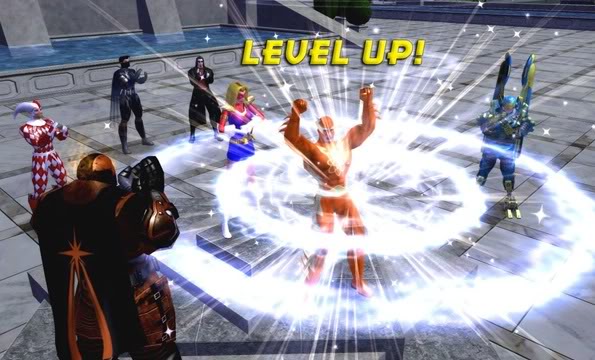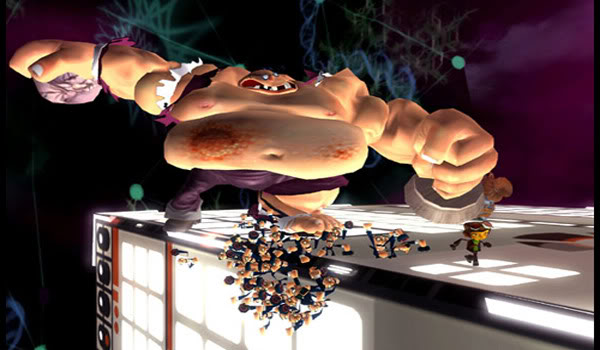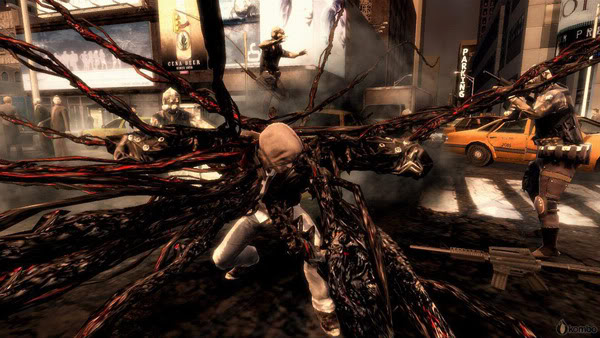This post has not been edited by the GamesBeat staff. Opinions by GamesBeat community writers do not necessarily reflect those of the staff.
When the hell did every game become an RPG?

So…what's he do during sex?
It seems like every single thing I play now (minus arcade-style throwbacks) makes me level up over the course of several hours. And if it's not blatantly making me hunt down every last experience point (sometimes disguised as money, essence, ADAM, upgrades, etc.) through endless side-mission corridors or pointless farming expeditions on uncharted planets, then it quietly charts my progress behind the scenes and unlocks content accordingly. That's just experience points minus the chirpy "You earned XP!" pop-up.
Hey, I get it. I know why developers always fall back on leveling systems. But it's a crutch, it's over-used, and it's time to do something about this situation.
Don't get me wrong: I like the option to customize a character to fit my play style…in a real RPG, where such decisions actually tie into the story and change the gameplay. What I'm seeing now just lets you buy stuff. New powers, increased powers, gadgets, guns, gun parts, car parts, skills, and other things that let you be a better badass. The game itself doesn't change at all. Put another way, these systems help a developer regulate difficulty on the cheap.
Just look at how they work. You've got to earn/find enough lucre to buy what you want, but the really cool toys don't unlock until you reach a certain point in the narrative, no matter how much money/XP you've got in your pocket. Forget merit or diligence. Developers don't want you plowing through the first five levels with a souped-up +400 Sword of Cutting Everything in Sight. That bad boy stays under wraps unto you're a few levels from the end, because it would (A) surgically remove any sense of challenge and (B) give you nowhere else to go for the duration of the game.

Assign three skill points to "Get my skinny ass outta here."
Minus even those two motives, leveling becomes entirely pointless. Why does Call of Duty: Black Ops need a leveling system? Or Halo: Reach? Multiplayer ranks should be a function of TrueSkill matching, and that's it. But no, those games apparently need sticks and carrots to keep people playing.
Adding this new stuff to your arsenal gives you the impression of progression and — maybe — prevents the game from getting static. Mostly, it's just bells and whistles. Enemies get tougher, you get tougher. Different buttons are mashed. I finished both Army of Two games with my starting weapons, modded to make things slightly easier. Stock guns would've worked fine, too.
So maybe we can start fixing this problem by creating leveling systems that matter, and then make them intuitive. Crackdown and the later Grand Theft Autos boosted abilities based on the practice-makes-perfect theory. Drive a car, you get better at driving a car. Simple. Makes sense. It also allows for seamless customization, since it rewards you for doing the things you enjoy.
But there's a lot to be said for ditching a leveling system entirely. Want to feel like a sexy god of death? Play the first 10 minutes of Prototype. Don't worry about the rest of it. That first sequence jumps ahead to the middle of the story, hands you a fully-upgraded, maximum-level killing machine, and turns you loose in the middle of a completely chaotic urban war zone. That's fun. You shred heavies and obliterate tanks with WWF-style elbow slams within seconds of hitting Start. Then the game takes you back to the beginning, where you have trouble navigating a chain-link fence.

Sorta puts your acne problem into perspective, doesn't it?
The whole game should've felt like that first 10 minutes. I love how Prototype gives you a sneak-peak of what's in store, but you never experience those power levels again. That's wrong. Instead of scaling up threats and challenges to your role as a staggeringly powerful superbeing, developer Radical Entertainment gives you a taste of greatness before defanging you — and their game — and retreating to the same tired XP/level up/buy stuff pattern everyone uses.
By comparison, Alan Wake actually did a pretty good job of moderating the abilities-to-difficulty ratio. Wake never levels, but he does gain and lose equipment throughout the game to match each section's threats. He drops his pistol during a helicopter crash, or leaves his shotgun at home because he doesn't need a boomstick in broad daylight. Pyschonauts, which I still hold up as a pinnacle of pacing and escalation, hands out a new power at a fairly regular clip (which you can then upgrade). Challenges then scale not only to the new weapons in your psychic arsenal, but to how you might use them in combination with old powers.
In effect, it wasn't just the character leveling up. You, the player, went up a notch in your skills and abilities, and in how you applied them.
So if you're going to have a leveling system — and it's far from indispensable — build one with depth. No more superficial "Hey, you get a sharper axe!" or "You learned to twirl around and hit people with your fists!" crap, or even "You earned a skill point, now buy yourself a nice treat" hokum. When a character evolves, so should the game, and so should the player. That's how you really take things to the next level.
